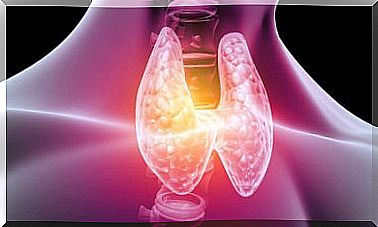What Effects Does Gluten Have On The Body?
There are those who have problems consuming gluten; likewise, the effects this protein has on the body varies in all people. Therefore, it is necessary to know what complications it can generate.
Currently, several conditions associated with the intake of this substance are recognized, but the most common are celiac disease and gluten sensitivity. Thus, in both, the body’s reaction involves the activation of the cells of the immune system.
What is gluten?
Gluten is a protein that is not present as such in food, but is formed when oats, rye, barley and wheat come into contact with water. Of these cereals, the latter is the one with the greatest capacity to produce it.
However, for 10,000 years, wheat has been part of the Western diet as a staple food. However, during this time the industry has modified it, making it increasingly resistant to pests and weather conditions.
Due to this, its consumption increased progressively, since its viscosity and elasticity made it a remarkable ingredient, not only for pastry products, but also as a food additive.
Thus, the overexposure of the population to gluten was favored and, consequently, associated diseases arose. In addition, it was determined that genetic predisposition plays an important role in their development.

Effects of gluten on the body
Scientific evidence shows that those people who have disorders caused by the intake of gluten, present gastrointestinal and extra-intestinal symptoms. In turn, damage to the villi brings other consequences.
Its most common clinical manifestations include the following:
- Diarrhea or constipation
- Abdominal pain.
- Excessive gas production.
- Feeling of fullness after meals.
- Headache.
- Fatigue.
- Depression.
- Muscle pains.
- Dermatitis.
- Anemia.
- Irritability.
Other complications associated with gluten
According to a study published in the Journal of Internal Medicine , it is common for children not diagnosed with celiac disease to show an inability to gain weight, anorexia, vitamin deficiencies, and tooth enamel defects, in addition to the above.
In addition to this, the same article shows that in adolescents and adults the manifestations tend to be more atypical. In general, the symptoms are nonspecific and appear to be unrelated to digestive system problems.
According to the Guidelines of the World Gastroenterology Organization , the continuous intake of foods with gluten can lead to other problems, such as those mentioned below:
- Endocrine disorders.
- Primary infertility.
- Recurring abortions.
- Delayed puberty.
- Early menopause
- Bone problems such as osteopenia, osteoporosis, and osteomalacia.
Similarly, it appears that people with long-term untreated celiac disease are at increased risk for complications such as intestinal cancer, malignant lymphomas, oropharyngeal tumors, and bone fractures.
Elimination of gluten in the diet
It is proven by science that the treatment of the diseases mentioned is the gluten-free diet for life. Although it is easy to eliminate products made from wheat, oats, rye and barley (TACC), it must be considered that this may be present in other foods.
Thus, ice cream, sauces, beer, whiskey and even some medicines contain it. Fortunately, packaging with the “TACC Free” and “Gluten Free” logos was implemented several years ago to identify gluten-free products.
Even so, it must be taken into account that meats, fruits, vegetables or other foods can be contaminated by the mere fact of being in contact with TACC, so you have to be rigorous and always prefer packaged products.

Healthy diet without TACC
Anyone who follows a strict diet, whatever it may be, must ensure that it is balanced. In the case of looking for alternatives to prohibited cereals, options such as:
- Rice.
- Son.
- Corn.
- Sorghum.
- Quinoa.
- Buckwheat.
- Amaranth.
If in doubt, the ideal is to consult a nutrition professional. After evaluating the particular case, the nutritionist will determine how the diet should be.
What should be clear about the effects of gluten on the body?
The effects of gluten on the body are varied. While some manage to digest it, others can develop diseases, especially digestive diseases. Faced with symptoms of intolerance, it is best to see a doctor to receive a proper diagnosis. Once the intolerance or celiac disease is confirmed, it will be necessary to adjust the diet.









